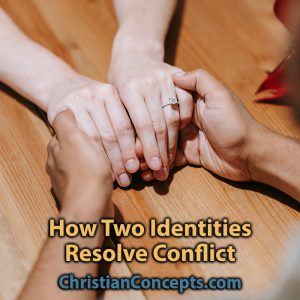Reading time: 3 minutes
People can approach conflict in only two ways. Some people prefer to avoid conflict and others pursue it. Often, it seems, that these two kinds of people end up marrying each other. But that’s more of an illusion than reality because approaches to conflict can be quite fluid depending upon what you value most.
For a couple to resolve conflict and become one in a healthy way, they first must know and understand their own values and priorities. You can identify your priorities using this simple exercise. Then you’ll have a foundation for deciding whether you can give in, compromise, or hold your ground.
Resolve Conflict for Minor Issues
For minor issues that are neither right nor wrong, you can be more flexible. Actually, you don’t have to be flexible, but you have the option of being flexible. Here are a couple of examples of this:
- You agree to paint your house the color your spouse prefers.
- You agree to a vacation in the mountains when you usually prefer the beach.
- You agree to visit your in-laws more frequently than you prefer. Optionally, you could decide to stay home and have some alone time.
The key to making a fair decision is to not lose sight of the individual and the marriage. You can’t always insist on doing everything the way you prefer. Neither should you always blindly do everything the way your spouse prefers.
Resolve Conflict for Major Issues
Major issues, such as fundamental beliefs about life and faith, are never meant to be compromised. Here are a couple of examples of this:
- You believe sexual intimacy is reserved for marriage, so you refuse to progress your intimacy beyond a certain point until after your wedding.
- Your spouse wants to lie about your finances to save money, but you tell the truth anyway.
- Your spouse teases you about your faith in Jesus Christ, but you hold fast to your faith.
However, sometimes you can adjust your behaviors without compromising your values. Here are a couple of examples of this:
- You don’t agree with a particular church’s doctrine, but you attend services there because your spouse wants to. You can still worship God in your heart the way you want to, so your individual integrity isn’t compromised.
- You don’t drink, but your son will have alcohol at his wedding. You go anyway but refuse to drink.
You make a conscious choice to reprioritize your values. Here are a couple of examples of this:
- Normally, family is your highest value, but after some personal reflection, you are ready to be more adventurous, so you agree to your spouse accepting a job that requires you to move away from family.
- Normally, a career is your highest value, but you agree to have a second child.
Resolve Conflict for Difficult Issues
Conflict resolution is easy, right? It is until it isn’t. If you find you can’t come to a resolution in one of the above four ways, you’ll need to go deeper to explore the source of your values. Could you be holding onto a value because of some unmet emotional need? Perhaps something like one of the following is true:
- You grew up in a home where your parents favored your sibling, so you rarely could choose what you wanted.
- You were bullied in school, and you never want to feel that way again.
- Your parents were extremely tight with their money, and you made a vow you’d never be like them.
Emotional scars form the basis for most “unreconcilable differences.” Conflict resolution will be much easier after you pursue emotional healing.
This solution for resolving conflict is the third and final post in a series on two identities developing closeness. You can read the first one: How Two Identities Become One, or the second one, Why Two Identities Struggle to Resolve Conflict, to understand the context.






